Yellowstone is the second largest national park in the US, spanning 2.2 million acres of land. But beyond its size, the park stands out for its extraordinary hydrothermal features, unlike anywhere else. Within Yellowstone, you’ll find steaming thermal pools, geysers, bubbling mud pots, and fumaroles. Diverse wildlife here consists of valleys filled with elk, bison, and howling wolves.
Yellowstone encapsulates the American West. The very first national park in the country, it attracts huge crowds, especially during the summer months. There is a lot to do here, with five park entrances, several geyser basins to see, and miles of trails to explore.
If you’re planning a trip to Yellowstone National Park, this guide covers everything you need to know. From what to do to the best places to eat, we’ll help you create an itinerary that aligns with your interests and trip duration. If you want to see most of what Yellowstone offers, your trip should be at least 3-5 days. However, you can touch the main highlights in a day or two if you don’t have longer.
Where is Yellowstone National Park Located?
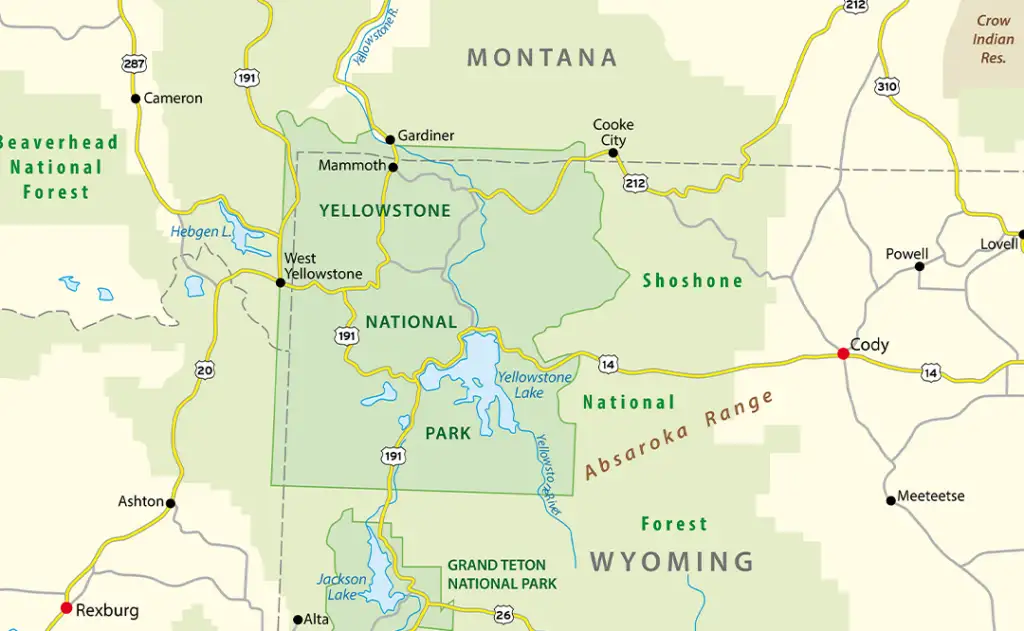
Yellowstone is a massive 2 million acres of land that sits atop a dormant volcano. Primarily located in Wyoming, the park spills over into Idaho and Montana. There are five entrances to Yellowstone:
- North entrance through Gardiner, Montana
- Northeast entrance through Cook City, Montana
- South entrance through Grand Teton National Park
- East entrance through Cody, Wyoming
- West entrance through West Yellowstone, Montana
Yellowstone is a popular road trip destination, so visits here are typically combined with Grand Teton National Park, Glacier National Park, Devils Tower, Mount Rushmore, or Rocky Mountain National Park.
Inside Yellowstone Park, a road network connects to form a figure of ‘8’. The main loop, Grand Loop Road, lets visitors see the major attractions in the park. Driving along each side of Grand Loop road will reveal waterfalls, lakes, geysers, and hot springs. Bisecting Grand Loop Road is Norris Canyon, where you can visit museums and even more waterfalls.
Best Things to Do in Yellowstone
There are a lot of activities to try and places to visit in Yellowstone National Park, from sighting wildlife to hiking and camping. There are approximately 900 miles of trails to explore in the park.
Yellowstone’s unique geothermal activities will make your experience worthwhile and unique on each visit. You can go back for years and still discover something new every time. For first-time visitors to Yellowstone, though, this is a great starting point to see the best of the park.
Old Faithful
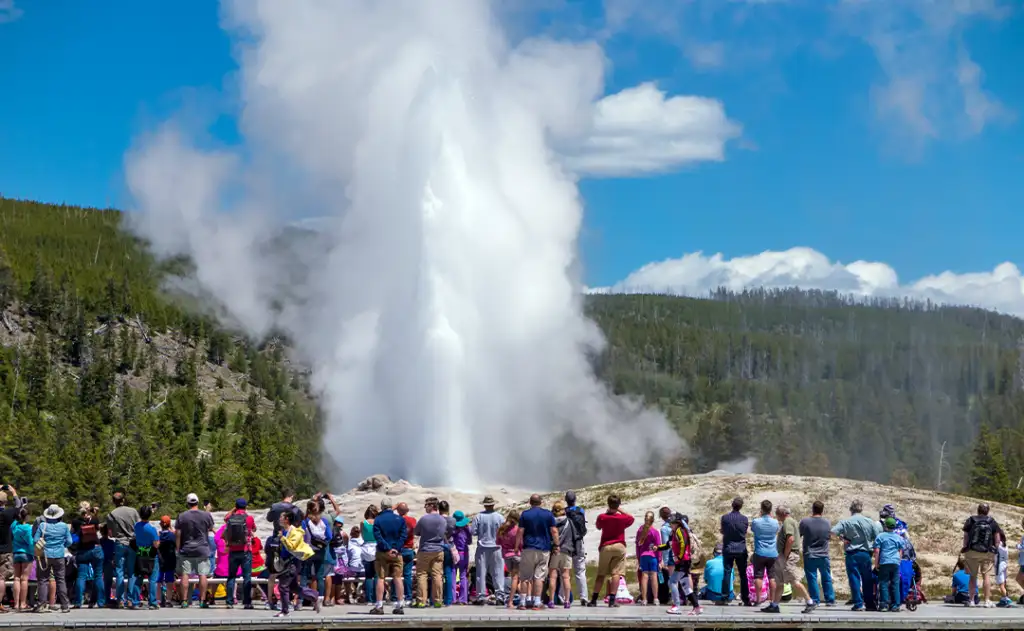
Old Faithful is the most famous of nearly 500 geysers in Yellowstone. Named for its frequent and predictable eruptions, this geyser has been erupting on a pretty reliable schedule since Yellowstone became the first national park in 1872. Old Faithful is so predictable that you can check eruption times on the NPS website to help plan your visit.
There are three ways to watch Old Faithful eruptions: sitting by the boardwalk, hiking up to Observation Point, or from Old Faithful Inn’s viewing deck. The boardwalk surrounds the geyser, but this area is always packed with tourists. Get here 30 minutes early to secure a good seat to watch the show.
To get a bird’s eye view, hike up to Observation Point. This short but strenuous uphill hike is 1.1-miles round trip. The extra effort is worth it since you’ll be away from the crowds and still get a stunning view as Old Faithful spouts jets of steam and hot water.
Lastly, you can find a more comfortable spot on Old Faithful Inn’s porch. Grab a drink at the bar and enjoy the view. Other things you can do around Old Faithful include joining a historic Old Faithful Inn tour, going to the visitor center, and grabbing a meal at one of the several restaurants.
Note: Old Faithful erupts roughly every hour and thirty minutes, give or take 10 minutes. The eruption usually lasts between 2 to 5 minutes. Check Old Faithful’s next predicted eruption time.
Upper Geyser Basin
Although Old Faithful is the most popular attraction in the Upper Geyser Basin, there are other amazing things to see and do here. Several geothermal features make this basin one of the best zones in the park to see geysers, hot springs, and thermal pools.
You can walk all the Upper Geyser Basin boardwalk trails in two hours and hike to Geyser Hill. You’ll find Grand Geyser, Solitary Geyser, Castle Geyser, and Grotto Geyser. Grotto geyser erupts only every 8 hours, but it can keep going for several hours once it starts.
For a beautiful sight, visit the Morning Glory Pool. It’s quite far away, but this hot spring is worth it.
Grand Prismatic Spring
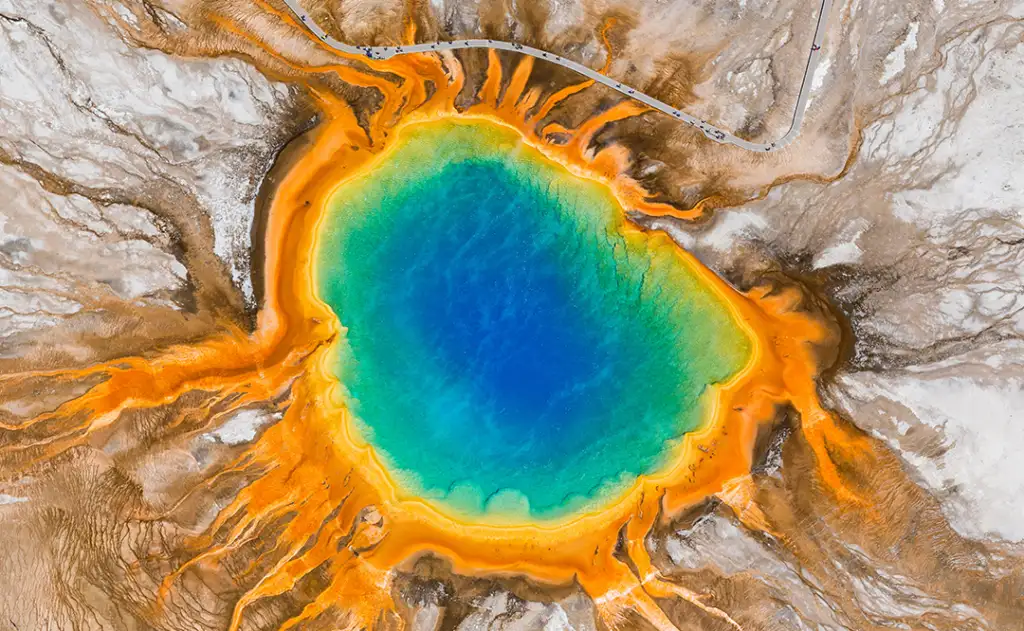
Grand Prismatic Spring is Yellowstone’s most impressive hot spring. It’s the third-largest hot spring in the world, and its vibrant gradient of colors is created by microbes that grow in hot water. The yellow microbes’ color blends with the brilliant blue of the spring to form the greens and then along the edges, and as the water cools, they change to orange and brown. These colors can also vary depending on the time of year.
Visiting this rainbow-colored thermal pool is one of the best things in Yellowstone National Park. You can get up close to Grand Prismatic Spring with the Midway Geyser Basin boardwalk trails or get the full mesmerizing view from the Overlook. Plan to visit on a sunny afternoon when the steam has lifted and the pool’s colors are brilliant.
Grand Canyon of the Yellowstone
The Grand Canyon of the Yellowstone is a valley formed by the Yellowstone River. This ever-changing canyon reflects the park’s complex geologic history in picturesque colors and shapes. You’ll find many overlooks and hiking trails to explore here. There are two rims along each side of the river, the North Rim and the South Rim. These two rims help you access various scenic overlooks that offer different perspectives of the river valley.
Popular viewpoints include:
- Artist Point: Aptly named, this South Rim overlook is arguably the best spot to take an iconic picture of the canyon. It’s also a short walk from the parking lot, so it should be top on your list to visit.
- Brink of the Lower Falls: A downhill trek to this observation point puts you at the edge of the Lower Falls as the water thunders. This is the best place to understand the river’s immense power.
- Lookout Point: Located along the North Rim, this overlook offers stunning views of the Lower Falls.
- Red Rock Point: This is another hike down the canyon that has great views of Lower Falls.
Norris Geyser Basin
Norris Geyser Basin has many geothermal features, like the Upper Geyser Basin. It’s also one of the most unique thermal areas in the park, as it’s always changing. These changes can include the formation of new mud pots, chemical changes to water, and increased activity of certain geysers. Norris Geyser Basin consists of two major basins, Back Basin and Porcelain Basin.
The larger Back Basin is where you’ll find Steamboat Geyser, the world’s tallest active geyser. Its major eruptions are highly unpredictable but can shoot hot, steaming water more than 300 feet in the air. Other thermal pools and geysers include the Porkchop Geyser, Emerald Spring, and Green Dragon Spring.
Porcelain Basin might be considered more thrilling thanks to soft blue thermal pools and noisy fumaroles that capture your attention.
Mammoth Hot Springs
Mammoth Hot Springs is a large network of hot springs close to Yellowstone’s north entrance. These springs are very different from other thermal areas in the park. At Mammoth, steaming hot water spills out over travertine layers, depositing white chalky minerals on the surface and sculpting gorgeous terraces.
You can spend an hour or more strolling the boardwalk past each viewpoint here or check out one or two overlooks for a quick visit.
Hike to the Peak of Mount Washburn
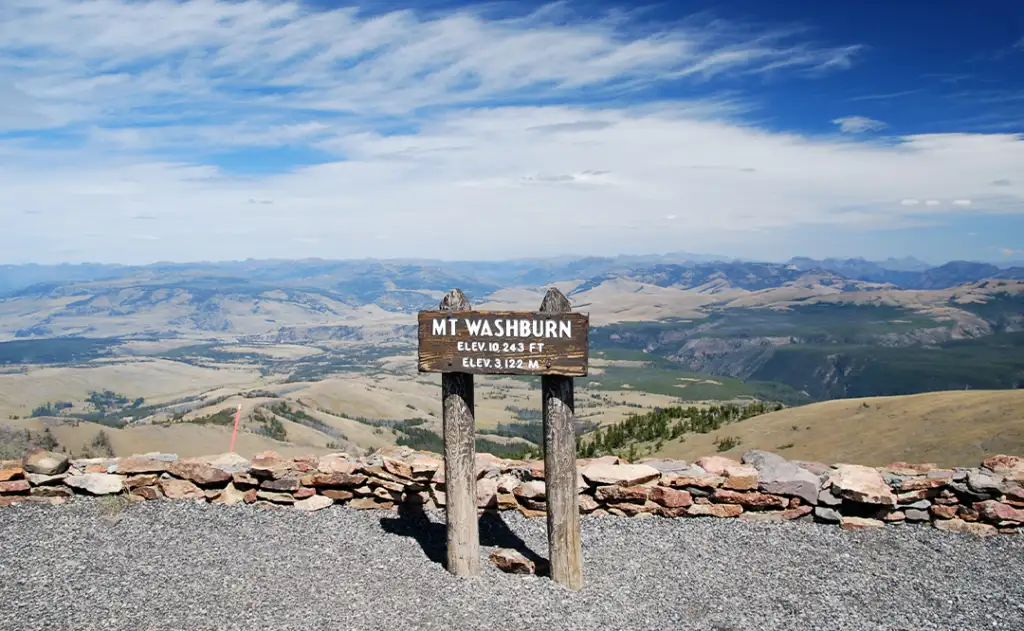
A popular part of Yellowstone for hiking and camping, Mt. Washburn offers panoramic views of the park. The moderately-challenging hike to the peak of Mt. Washburn is about 1,400 feet and takes 3-4 hours round trip. There are two trails you can hike up here. Dunraven Pass trailhead offers a more scenic walk, while hiking from Chittenden Road is about a mile shorter. Dunraven is 6.2 miles roundtrip, and Chittendon Road is 5 miles roundtrip.
You’ll usually see pica, chipmunks, and sometimes even bighorn sheep. This hike is best done on a clear day and in groups because this is grizzly territory. Bring your bear spray and avoid hiking in September when the bears are getting ready to hibernate.
Fairy Falls
One of Yellowstone’s tallest waterfalls, Fairy Falls, is worth a visit. It’s an easy hike to get here, and you can plan a visit to Fairy Falls with the Grand Prismatic Spring Overlook.
Start from the Fairy Falls parking lot, which is the same lot used when visiting the Grand Prismatic Spring Overlook. On the 2.7-mile hike, you’ll be trekking through a forest, so you may come across bears and other wildlife.
Sight Wildlife in Hayden and Lamar Valleys
Lamar and Hayden Valley are two popular spots to watch bison and other wildlife in Yellowstone. Lamar Valley is especially touted as the best area to see diverse wildlife, including bison, elk, bears, pronghorns, coyotes, and wolves. An hour from Mammoth Hot Springs, Lamar Valley is far from other attractions but worth the long drive. The best times to view wildlife are in the mornings and evenings. Plan to leave your lodge early or tour other attractions during the day and save this for last.
Hayden Valley is centrally located and easier to access, but this also means it gets more crowded. You’ll see bison herds in the distance or along the roadside if you get lucky. You should also be prepared to get stuck in animal traffic jams. Bison are known to stop in the middle of the road, blocking traffic in both directions.
Note: You should always watch bison from the safety of your car. These animals have been known to charge tourists and can do great damage. Park in a turnout to view the bison, or if you have a sunroof, crack it open for an unobstructed view.
Artist Paintpots
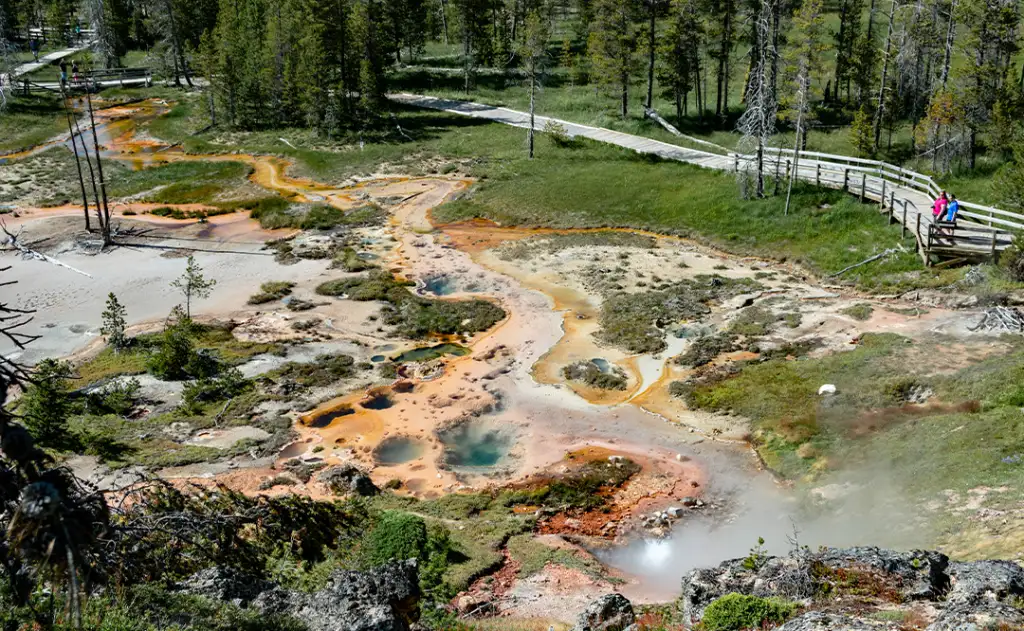
Artist Paintpots is a small area off Grand Loop Road south of Norris Geyser Basin. It contains a few large hot springs, geysers, and the oddities that are mud pots. You’ll walk about half a mile down the trail from the parking lot to the Paint Pots. It might feel like a long walk to get there, but watching the bubbling mud pots is worth it.
Most thermal features here are on Paintpot Hill, so you’ll love the view from the upper boardwalk trail. Remember to climb carefully, as some of the steps are uneven.
Preparing for Your Yellowstone Trip
Yellowstone National Park Fee
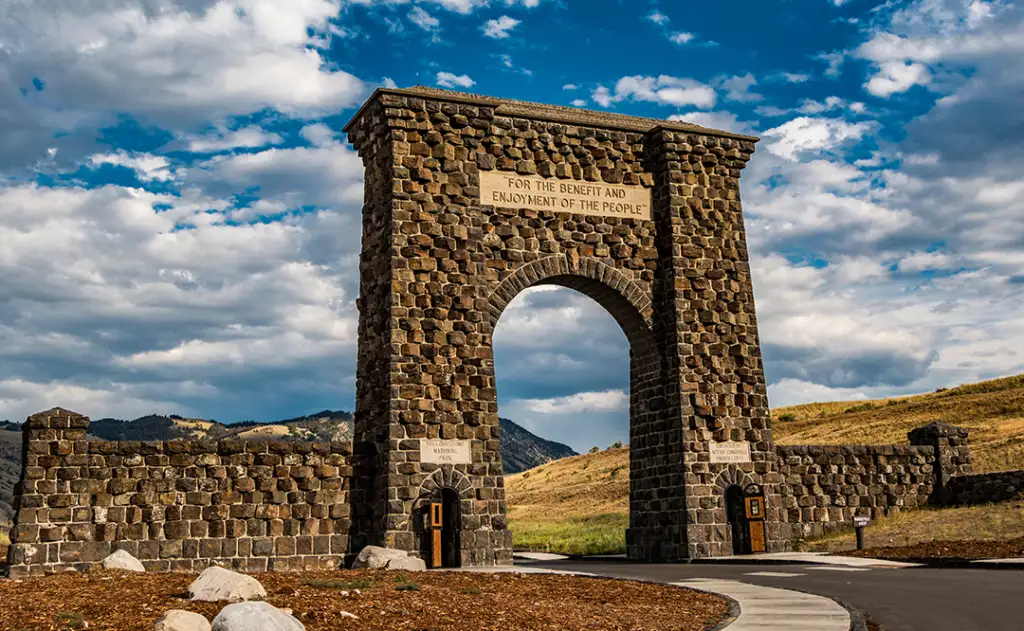
Yellowstone’s entrance fee is $35 per car, valid for seven days. This pass covers everyone in your vehicle. There’s also a motorcycle 7-day motorcycle pass for $30.
If you plan to visit other national parks on your trip, such as Grand Teton and Glacier National Parks, you should opt for the America the Beautiful Pass. This pass is valid for one year and costs $80. Purchasing the annual pass will save you money on your trip and also get you free admission to all other national parks and federal recreation sites for 12 months.
There are other discounted entrance passes for certain ages and social groups. Senior citizens, for example, can get a lifetime senior pass valid in all national parks for $80 or an annual pass for $20. And for US families with a fourth grader, you all get into National Parks free during their school year and the next summer as part of the Every Kid Outdoors program.
What to Bring On Your Trip to Yellowstone
Bring a spotting scope or some good binoculars to see Yellowstone like a pro. Known for vast herds of bison and elk and a thriving wildlife population, you don’t want to miss your chance to sight critters in the park. If you’d rather not buy a spotting scope, rent them from stores in West Yellowstone or Gardiner (starting at $25 a day).
Invest in good hiking shoes to hike some of Yellowstone’s popular sights. While a few of these trails are pretty easy, you’ll usually walk long distances up and down steep heights. You need comfortable footwear that protects your feet from rugged terrain and fatigue.
Most importantly, travel light. Yellowstone Park has no public transportation, so you’ll likely be driving from one part of the park to another. If you’re camping or staying at different lodges, the last thing you want is to pack up lots of stuff every time you transfer.
Be a Cautious Traveler
While cases of people dying in Yellowstone are rare, they do happen. Avoid petting or feeding animals in the park, and maintain a safe distance from wildlife. Don’t venture off designated trails, try to swim in thermal pools, or walk over delicate ecosystems just for a better shot. When you’re in bear territory, stay in groups and carry bear spray.
We must respect the environment and leave areas just as we met them to benefit future travelers. Remember to properly dispose of waste, pack out what you bring to the trail, minimize campfire impact, and be considerate of other hikers.
When to Visit Yellowstone
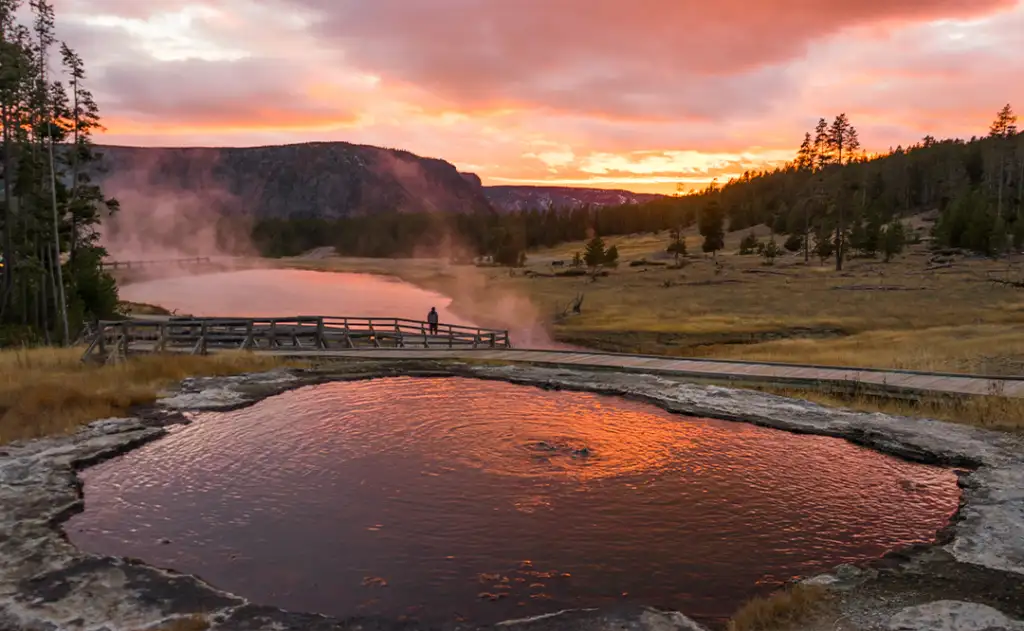
The best time to visit Yellowstone is from June through October. Many park roads are closed due to snowfall from November to May. You can visit the park in the winter, but you must get around by snowmobile or snow coach.
Needless to say, expect huge crowds in the summer months, especially in July and August. Almost 2 million visitors travel to Yellowstone in this period. Expect to find a popular attraction like Old Faithful always crowded, and locating a parking spot at midday is almost impossible.
To avoid the most crowds, head out early in the morning, and be prepared to venture into the backcountry. Crowds thin out significantly after a few miles on boardwalk trails, and most people don’t go beyond the most popular attractions. Take advantage of this to escape people and discover hidden gems all over Yellowstone.
How to Get to Yellowstone National Park
Yellowstone National Park is located in the northwest corner of Wyoming. You can catch flights to nearby airports and then drive down to Yellowstone. Here are the options:
- Bozeman Yellowstone International Airport, Montana: 80 miles
- Idaho Falls Regional Airport, Idaho: 110 miles
- Yellowstone Airport, West Entrance of Yellowstone: 3 miles
- Yellowstone Regional Airport, Cody, Wyoming: 55 miles
- Jackson Hole Airport, Jackson, Wyoming: 70 miles
- Salt Lake City International Airport, Utah: 325 miles
- Rapid City Regional Airport, South Dakota: 440 miles
Yellowstone Airport at the park’s west entrance is the closest option, just 10 minutes away from Yellowstone. However, only two airlines fly here, reducing your options significantly. Bozeman airport is a popular choice—it’s about 1.30 hours away from Yellowstone and connects to over 20 US cities.
Where to Stay In Yellowstone
The best place to stay in Yellowstone depends on your travel plans. Yellowstone is massive, with five park entrances and multiple villages and towns in and around the park. We recommend staying in two different areas if you spend three or more days here. Switching accommodations can help you reduce travel time within the park. If you’d like to stay in one place, Canyon Village is centrally located to many attractions in Yellowstone.
Inside Yellowstone Park
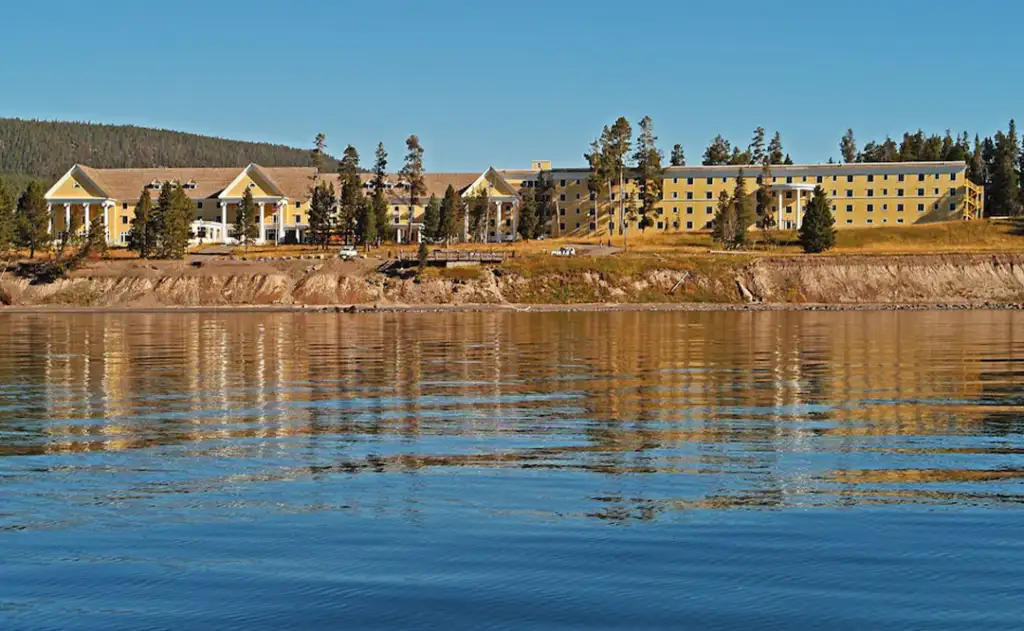
Nine hotels offer over 2,000 rooms and cabins inside Yellowstone Park, including the Old Faithful Inn and Lake Yellowstone Hotel. Twelve campgrounds are also available around the park; some require reservations, while others are on a first-come, first-served basis. If you’re camping in Yellowstone, be conscious of your surroundings; you’ll share the territory with predators like grizzly bears.
Lodging Outside Yellowstone
Staying in one of the towns outside the park will increase your drive time but can save you money and take you away from crowds. Popular towns to stay at are West Yellowstone and Gardiner in Montana and Cody, Wyoming.
Some top Hotels in these areas are:
- Terra Nova Cabins is a cozy hotel in a quiet area of West Yellowstone. It’s 20 minutes to the northwest entrance of Yellowstone National Park, and you’ll love the scenic drive.
- Wagon Wheel Hotel takes inspiration from the natural beauty of the surrounding Yellowstone area. Its rooms have a rustic-chic vibe, with most having walls of wood.
- Best Western Premier Ivy Inn & Suites is an upscale hotel in Cody, Wyoming. It has a heated indoor pool, hot tub, and an onsite restaurant.
- Holiday Inn Cody at Buffalo Bill Village is an affordable hotel in Cody. Rooms are laidback with minimal decor and a fitness center. The Inn is 52 miles from the east gate of Yellowstone National Park.
- Dreamcatcher Tipi Hotel offers a unique experience in Gardiner. Guests sleep in well-furnished romantic tipis, and there’s a mini-market and onsite bar. In the evenings, you can share s’mores and drinks over a campfire.
Where to Find Food and Drinks in Yellowstone
You’ll find restaurants and stores selling snacks and drinks at major tourist areas in Yellowstone. Remember to stock up on water and snacks before hiking. Popular areas include Canyon Village, Grant Village, Mammoth Hot Springs, Old Faithful, and Tower Falls. You’ll find everything from marina stores to cafeterias.
For gourmet meals, venture outside the park to the Grill at Sage Lodge, Montana, which serves meat dishes like bison fillet and chicken-fried rabbit. Gardiner is also popular for its eateries and restaurants.
You can also build a picnic from the stores to have lunch on the trail. I recommend Mammoth Terrace Grill or Old Faithful Inn Bear Paw Deli for snacks and light fare.
You Might Also Like:
• How to Use the iPhone’s Satellite SOS When Traveling• How to Check if You’re Flying on a Boeing Plane
• Discover New York City: The Best Tours to Explore the Big Apple
• The Most Offensive Things You Can Do on a Plane
• How to Replace a Lost or Stolen Passport While Traveling
We hand-pick everything we recommend and select items through testing and reviews. Some products are sent to us free of charge with no incentive to offer a favorable review. We offer our unbiased opinions and do not accept compensation to review products. All items are in stock and prices are accurate at the time of publication. If you buy something through our links, we may earn a commission.
Related
Top Fares From
Today's Top Travel Deals
Brought to you by ShermansTravel
Italy: 8-Night Rome, Florence & Venice...
Infinity Worldwide Vacations
 vacation
$2335+
vacation
$2335+
Athens to Venice: 9-Night Cruise w/Choice...
Windstar Cruises
 cruise
$3999+
cruise
$3999+
Ohio: Daily Car Rentals from Cincinnati
85OFF.com
 Car Rental
$19+
Car Rental
$19+




